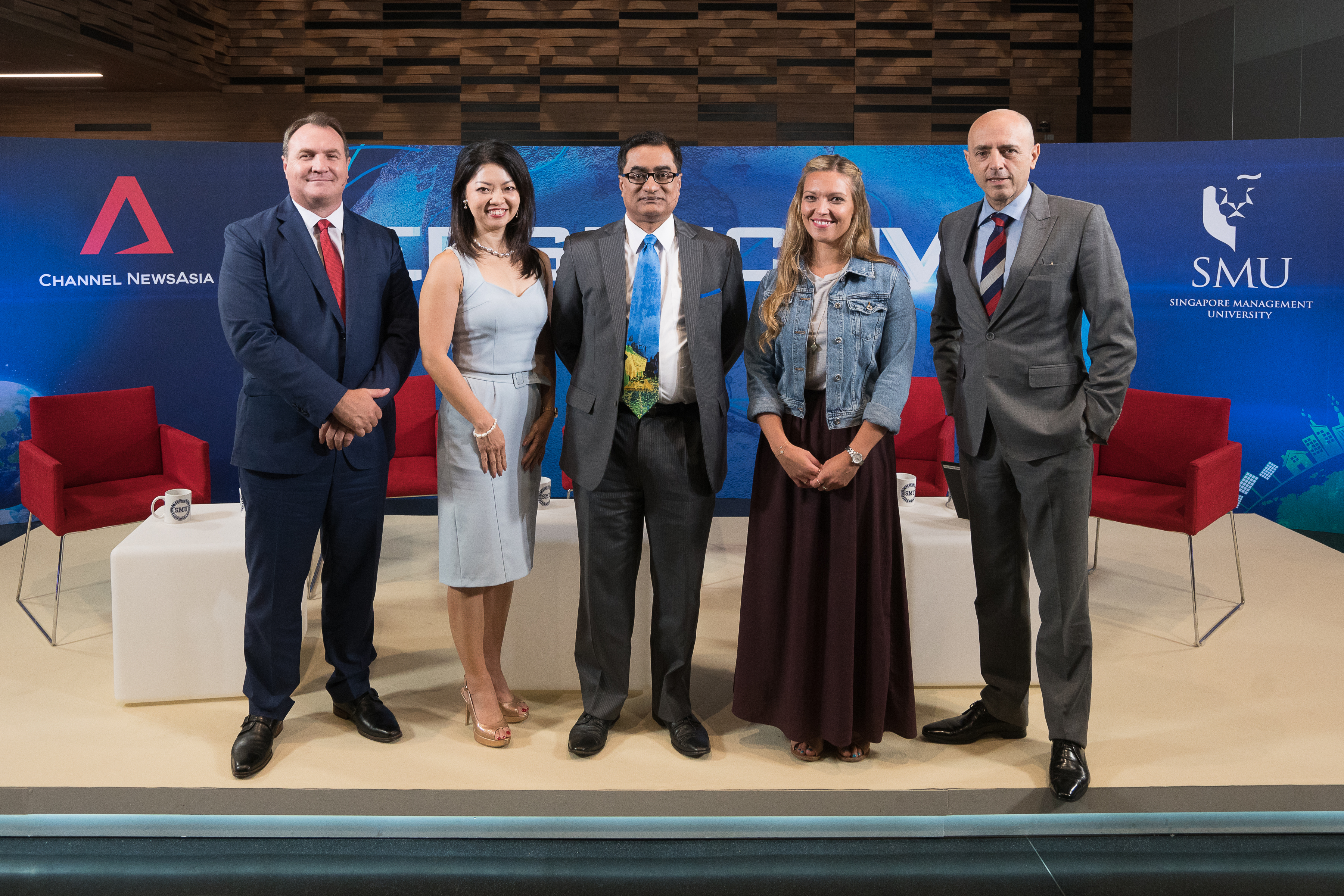
How companies are changing the way they do business, and why battling climate change goes beyond just corporate efforts.
In episode 3 of Channel NewsAsia’s Perspectives, “Going beyond Green”, recorded at SMU, the topic of sustainable business practices was comprehensively discussed. Aside from how businesses can help contribute to the green movement, emphasis was also put on the government, public and private sectors and individuals to work hand-in-hand in the effort to save the planet.
The panel comprised Laura Kantor, Head of Marketing and Sustainability at Foodpanda; Shantanu Bhattacharya, Professor of Operations Management at SMU; Genevieve Chua, Managing Director at Spicers Paper (Singapore); and Matt Gray, Commercial Director for Asia Pacific at DSM Engineering Plastics. Moderated by Teymoor Nabili, the panel went in-depth in past and present efforts of sustainable business practices, and explained how the private business sectors can’t do it alone.
On a business level
When it comes to sustainability, the traditional concern for most businesses is the cost it might incur. But with more and more customers supporting greener companies and eco-friendly practices, Shantanu begs to differ.
In the short term, it is inevitable that sustainability involves higher costs, says Shantanu. But in his research, once that cost has been factored in and represented to the customer, the customer’s willingness to pay for your products and services gets higher. “That customer gives you that market value in the market, so I would say that both in terms of actual market impact, and in terms of cost savings from reusing, recycling, remanufacturing, it should show in the financial bottom line as well as in overtime,” he adds.
Genevieve concurred that adopting sustainable business practices early maximises sales in the long run. After Spicers Papers started raising awareness, Genevieve reported that sales have gone up more than 10 times over the last decade and reflected that rather than seeing it as a cost, she saw it more as an investment in the long run.

Multi-levelled and multi-sectored collaborations
However, saving the planet and adopting sustainable practices is not a business-only movement as it involves the cooperation of consumers, supply chains, public sectors and the government.
DSM Engineering Plastics has started recovering fishing nets off the coasts of India to be reused as a material for one of their products, Akulon Repurpose, and this has created a small microeconomy of collaboration involving different communities, says Matt Gray.
“Today, we have recovered at least two to three thousand tonnes of fishing nets with the collaboration of communities where they pull these fishing nets out of the ocean and getting them sorted cleaned and granulated before sending the material back to our operations in India. There are still 600,000 tonnes of fishing nets in the oceans, so it’s a small impact but it’s one way and we’re trying to address the problem and create a circular economy,” explains Matt.
While businesses are starting to do their part in creating a more sustainable future by partnering with supply chains and creating awareness within consumers, the panel agrees that the government also has an important role to play as a shaper of public opinion.
Genevieve emphasises that it has to be a multi-pronged approach involving all levels of society, government and companies
Shantanu concurs. “The government of course has an important role to play as a shaper of public opinion and this is not a unilateral approach. The one thing that the government cannot do is drive away business. The minute you start making the environmental laws extremely strict, you end up hurting business and no country can afford that, especially not Singapore, which does not have adequate natural resources. So the way I would suggest is a mix of government and the private sector. There are partnerships known as public-private partnerships that try to determine, or see directions that should be taken in different sectors.”
The importance of education
At the end of the day, it boils down to education. Educating consumers, business owners and supply chains from top-down and bottom-up. While business owners do their part and governments gather to fight climate change, creating awareness and education among consumers on the ways they can do their part is equally crucial.
Laura stresses that as individuals, we need to constantly learn and explore new ways to create sustainable lifestyle habits.
“I think sustainability can really start with some baby steps like waste reduction. Looking at our diet is also another way to go about it as Matt mentioned about methane and cows being one of the biggest causes of methane. So, even potentially looking at reducing meat consumption in your diet is a movement in the right direction. There are a lot of other things we can do as a conscious consumer and that also includes looking at food wastage, packaging and purchase choices such as purchasing things we don’t need just to throw them out later on.”
As the discussion draws to a close, the panel concluded that the key is to educate consumers while businesses continue to find ways of making production and practices sustainable and eco-friendly. They also highlighted that the culture of organisations need to live and breathe sustainability from the top-down and bottom-up.
“It’s more than just recycling or maybe having an employee day where you all go and plant a tree. It has to be a fundamental part of everything that you do and again I’ve said this a few times, education is so important, empowering your employees to get excited as well. It has to not only come from the management but also from your employees, to become company culture and part of everything you do.”


